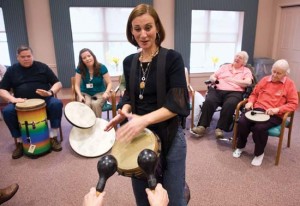Posted on July 10, 2015

Treating cases of addiction and mental disorder is tricky business, but not all of it involves cognitive work on the self. Some therapies for addictions and disorders are merely sensory, such as music therapy. Applying the healing powers of music to addictions and mental disorders has proven to be a highly effective and accessible treatment option. Music has shown to relax, invigorate and balance people who are struggling with mental problems, alleviating a number of their symptoms. Music alone is not a fix for addictions and disorders, but it can be a strong component in recovery.
The process of listening to music is highly rewarding without being at all strenuous. Addicts and people with disorders are often given soothing music to listen to in treatment to help calm them and act as a therapeutic activity. Listening to music is a very sensory experience that offers the receiver a great deal of reward. They are free to let their imaginations wander, let their minds piece together a solution they have been grappling with, express emotion through tears or singing along, analyze the music to understand how it works or use it to enhance another activity.
For those addicts and people with mental disorders who are musicians themselves (which is not uncommon among musicians), the opportunity to write music is also readily available. Musicians who are struggling with addiction or disorder can greatly enhance their recovery by turning to their creative expression of choice to process what they are going through. Mental struggles have frequently spawned some of the best songs ever written because music can express what words cannot about a heavy mental struggle. Turning the devastation of addiction and disorder into a musical creation is one of the best ways to channel the energy that is generated by the mental struggle. Those who suffer from a co-occurring disorder of an addiction a mental disorder would benefit most from a dual diagnosis rehabilitation, but supplementing treatment with music therapy is always recommended.
There are many methods of enjoying the benefits of music. Whether you are receiving music or creating music, you will certainly discover mental benefits of it. If you are struggling with addiction or a mental disorder, it is important that you reach out to mental health professionals for treatment, but do not neglect the healing powers of music in your journey of recovery.